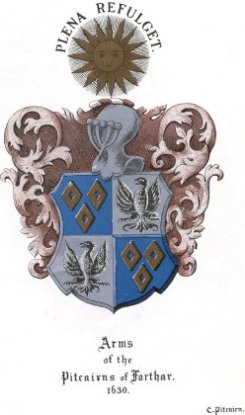|
Notes
Son of Rev Robert Pitcairn of that Ilk
and Denne Mallam.
William Pitcairn, born in Kintbury Berks
on December 1st 1781, was the fourth son of the Rev
Robert Pitcairn. He
was only eleven years old when his father died.
He was apprenticed in London when quite young (only
fifteen), and became a West Indian merchant. He acquired a large fortune, but later on trade with the West
Indies became very bad, owing to the agitation about the slaves
and from other causes, and he lost about£40,000 on his properties
there. However, this
did not seem to affect his happiness in any way.
He was of a most cheerful, contented, and beautiful
character, and settled down very comfortably in his later years in
a smallish house (Culver Cottage) he had built for himself at
Bognor, and was very happy there.
Unfortunately it did not suit his wife; he therefore sold
it, and they went to live with his nephew, the Rev James Pelham
Pitcairn, and his wife, at Longsight Rectory.
He was of that benevolent disposition
which finds heartfelt pleasure in doing good to others.
United to great rectitude of character and very good
business habits, he had the kind disposition, so that in his long
life there were very any who turned to him for advice and counsel.
He was trustee, not only for his own
relations, but for a very great many other people.
Sons and daughters of old friends were his wards, to whom
he behaved as a father, and also he managed (with others) many
public trusts.
Mr Pitcairn was very much respected and
loved by all his friends of whom he had a great number, only one
of his wards seems not have merited his kindness.
Mr Pitcairn had a most loving nature, and
was a devoted husband to a wife ailing for years, a true and
faithful friend, extremely fond of his only remaining brother, Sir
James Pitcairn, and good to all his nephews and nieces.
In 1796 he got his indenture as
Apprentice to the Skinner’s Company, and on the 6th
December 1803he had the Freedom of the City, and was eventually
made Master of the Skinner’s Company. In 1808 he went to Jamaica, was Collector of Customs, and
attended to his own property there.
He then returned to London, and became a merchant in that
city.
Mr Pitcairn had slaves, and it is curious
now to read an entry like the following one, In his scrap-book –
At Morant Bay, 18 September 1808, there
is an entry in the Church of St Thomas in the East –
This is to certify that a Negro girl
named Sally Forester, the property of William Pitcairn, Esquire,
Collector of His Majesty’s Customs at Port Morant, Jamaica, was
this day baptized in the Parish Church by John West, Rector.
That I, this 27th day of April
1810, agree to sell with a warranted title, and to
make over my right and title so warranted, to a certain
Negro man called Charles, to William Pitcairn, Esq., Collector of
His Majesty’s Customs at Port Morant, Jamaica, in consideration
of the sum of one hundred and ninety pounds, currency, well and
truly paid to me by the said William Pitcairn on or before the 20th
July 1810. Mick
O’Hagan.
Two years afterwards William Pitcairn
gave his slave his freedom –“I give unto Charles, the above
named and mentioned man – my Negro male slave, his freedom after
my death – indeed immediately.”
William Pitcairn.
This man still continued Mr Pitcairn’s servant, returned
with him to England, and was baptised in London.
Mr Pitcairn married, in April 1820
Phoebe, daughter of Mr Richardson.
His later years were spent with his
nephew, James Pelham Pitcairn, at the Rectory, Longsight, where
his wife died. When
Canon Pitcairn was appointed to Eccles in 1861, his uncle came
too, but died in the following year aged eighty-two, and was
buried I his own vault in Longsight.
His old age was a beautiful one, for he had a most
unselfish character, and died beloved, and regretted by all his
friends and relations.
|


